North Carolina 2020 delegate William Harris Amplifies Outreach Efforts to Assist Charlotte Residents with Citizenship Process.
We continue our Blog series about the 2020 delegates and how they have been faring since Washington Week was canceled due to the global pandemic. Two outstanding student leaders are selected to serve as USSYP delegates from each state in the nation, as well as the District of Columbia and the Department of Defense Education Activity. Learning of the breadth and beauty of our country as delegates share home state stories and photos is one of the profound gifts of the program.
USSYP: Can you give us a quick timeline of what has been happening in your life since the announcement of the pandemic?
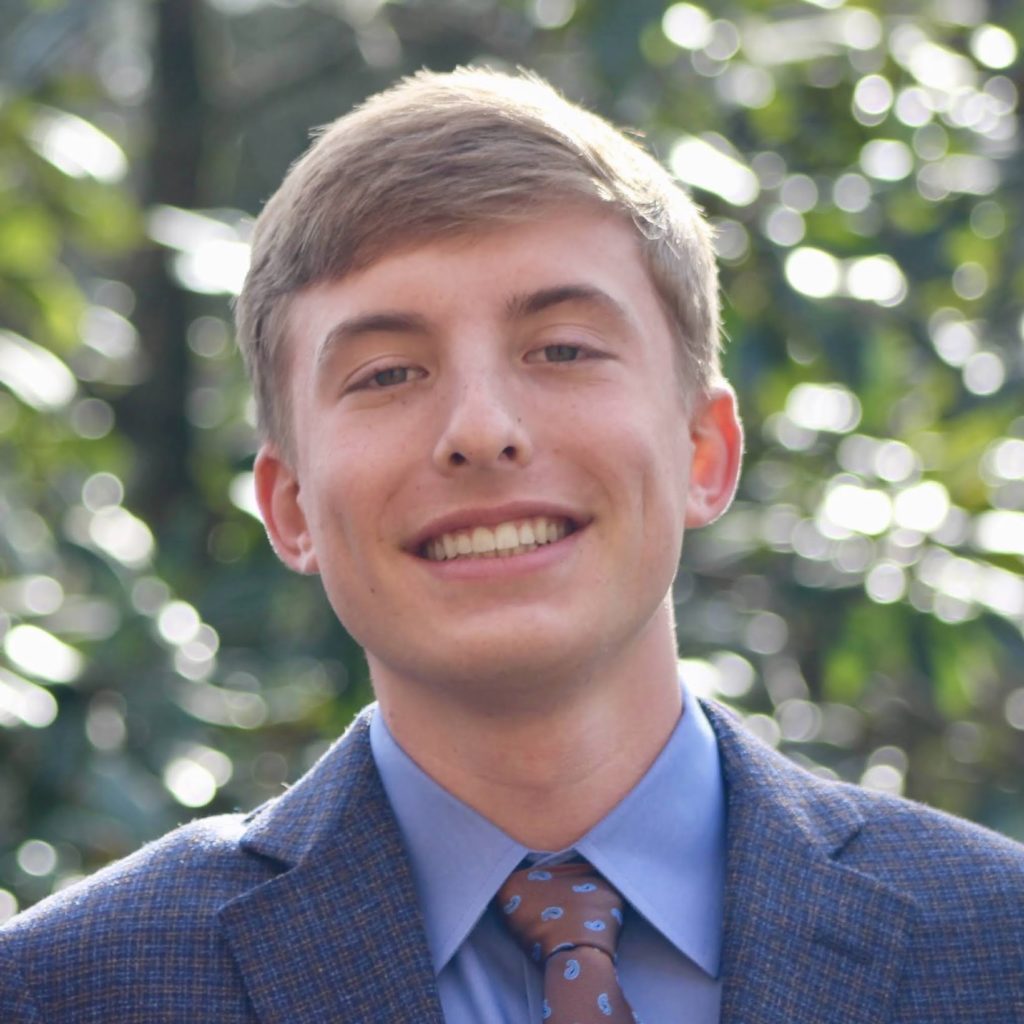
I am from Charlotte, North Carolina, and a recent graduate of Charlotte Country Day School, a Junior Kindergarten through 12 independent school where my mom teaches Kindergarten. Along with the other 114 seniors in my graduating class, I experienced a shorter school year than I was expecting. Our last day of in-person classes was on March 12, shortly after the cancellation of Washington Week. Although we continued with virtual, asynchronous classes throughout the Spring, I remember feeling like my senior year had already ended. This wasn’t because my school didn’t try to find ways to celebrate our graduating class, but rather because it seemed like the pandemic had prematurely thrust me into the proverbial “real world” that I was expecting to enter after graduation.
Not only that, but the event I had been most looking forward to as a senior was Washington Week: a once-in-a-lifetime opportunity to attend meetings and briefings with senators, members of the House of Representatives, Congressional staff, the president, a justice of the Supreme Court, leaders of cabinet agencies, an ambassador to the United States, and senior members of the national media. The “real world” I entered was clearly in a state of emergency that went beyond COVID-19 alone. America’s COVID-19 catastrophe seemed to consist of several crises, from worsening income inequality and steepening healthcare costs to racism and antipathy towards immigrants, compounded and exacerbated by a global health nightmare. As someone interested in public service, I saw this as a tipping point: a time where shortcomings were apparent and an opportunity was present to promote more accessible, equitable, and inclusive governance.
The close of the school year was not without its highlights: my twin brother Foster and I were honored to receive the City of Charlotte’s Richard Vinroot International Achievement Award for our work on a citizenship initiative: Naturalize Charlotte. The award recognizes those “who have worked for the continued internationalization of Charlotte,” who have “contributed to efforts to improve the international community,” and “have a record of outstanding service to the greater Charlotte community.” Foster and I were humbled to be the first recipients under the age of 40 in the 22-year history of the award, which is presented annually by the Mayor of Charlotte. In addition, we were able to pick-up our high school diplomas as a part of a small, socially-distanced ceremony on our school’s campus.
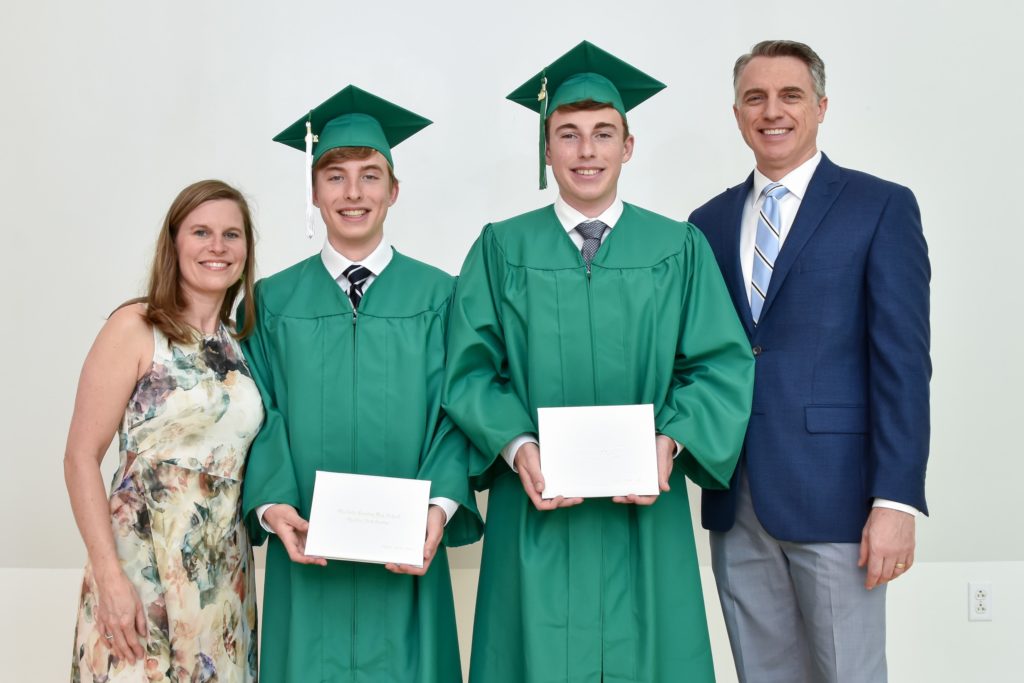
William Harris with his parents, Sherry and Richard, and brother, Foster, at Charlotte Country Day School’s diploma pick-up ceremony.
USSYP: Did you have an opportunity to partake in the Washington Week ONLINE sessions, and if so, which speakers and events were most impactful for you?
I was able to participate in several Washington Week online sessions, and I really enjoyed them. It was certainly timely to hear lessons in leadership from prominent public officials as COVID-19 underscored the importance of good governance and the value of our civil service. It was particularly interesting to hear from Brian Kamoie, Distinguished Chair of Leadership at the United States Naval Academy, given his prior work at FEMA. Hearing from trailblazers like Senator Tammy Baldwin was incredibly exciting as well.
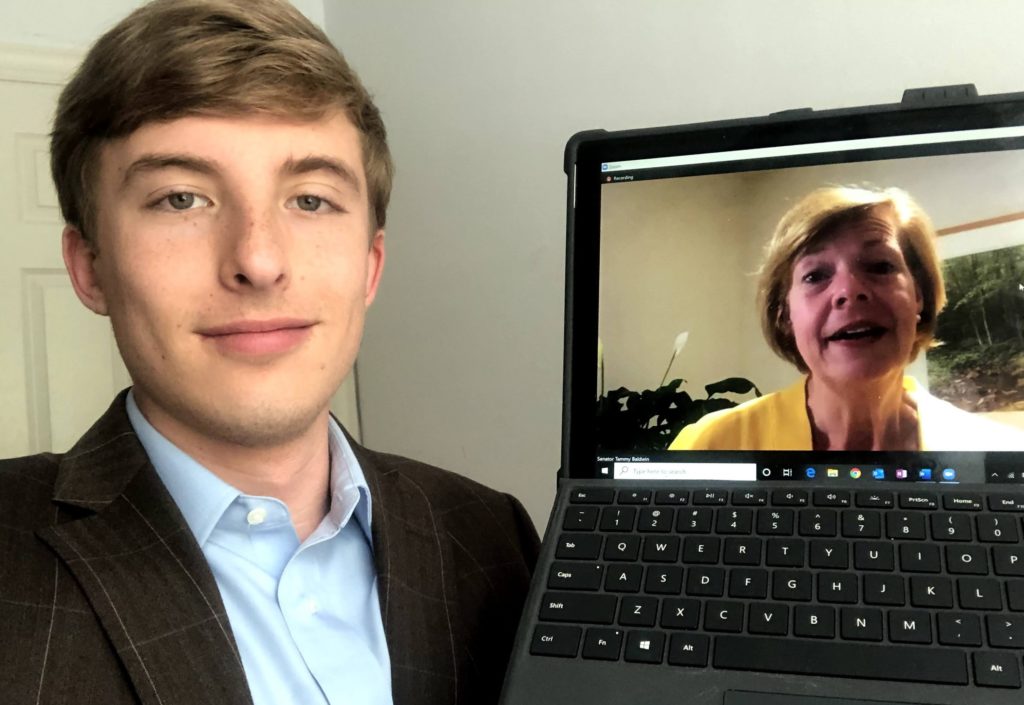
Senate Youth Program Democratic Co-Chair Tammy Baldwin participates in Washington Week Online.
USSYP: Technology has made it possible for you to know and be engaged with your fellow 2020 delegates. Have you formed friendships or special connections?
My fellow USSYP delegates in the class of 2020 never cease to amaze me. Although it has been harder to connect as a class than I imagine it is in-person at Washington Week, I have enjoyed learning about my USSYP peers over GroupMe and through other virtual platforms. It is wonderful to be included in a group of people who are so smart, kind, and passionate about making a positive difference both in our country and in the world.
USSYP: Has the pandemic had any positive effects in your life? Have you taken up a new hobby or read any books during this unusual excess of time that you can share or recommend? What do you feel you have learned from this experience so far?
For me, one of the silver linings of the pandemic has been the additional time I have enjoyed spending time with family, reading, and running. Some of my favorite moments during the pandemic have been hiking North Carolina’s Blue Ridge Mountains with my family and surfing in the Outer Banks. I highly recommend several books that I read throughout the pandemic. Yuval Noah-Harari’s 21 Lessons for the 21st Century greatly impacted the way I conceptualize the future, and its analysis of Big Data was simultaneously enthralling and concerning. Justice Stephen Breyer’s books Active Liberty, Making Our Democracy Work, and The Court and the World provided me with an excellent primer on Breyer’s jurisprudential philosophy as well as an interesting view of the judicial branch as a partner in our democratic process and as an active player on the global stage. Cormac McCarthy’s The Crossing was a gripping, tragic literary masterpiece. I have been running a lot to prepare for college athletics and am looking forward to participating in Varsity Cross Country at Haverford College this fall, whatever form it may take due to COVID-19.
USSYP: The pandemic is also a time to show leadership – in your community, through your school, with family and friends. Have there been any instances where your natural inclinations toward leadership and service have shone through?
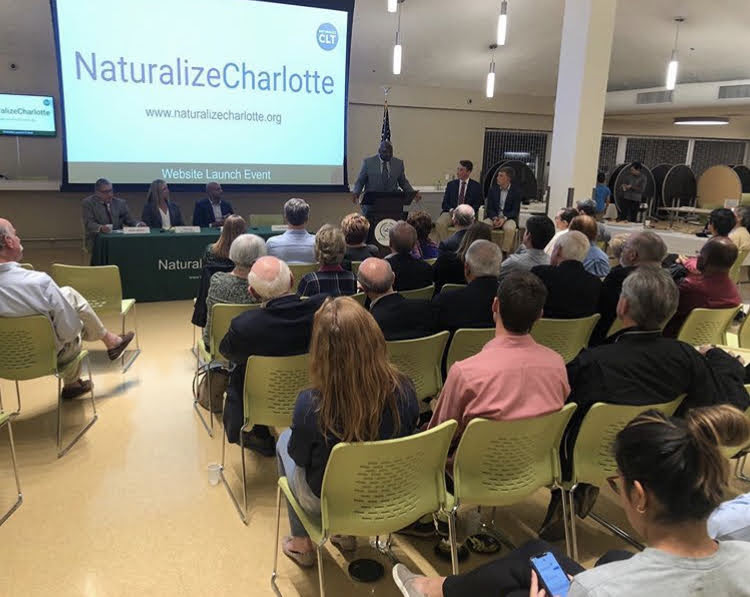
William Harris, with his brother Foster, pictured at the Naturalize Charlotte Website Launch Event in October 2019.
Before the pandemic, I had co-founded Naturalize Charlotte, an initiative to support residents applying to become naturalized US Citizens in my hometown. Along with my twin brother, Foster, who had co-founded that project with me, I started working on a webpage to house multilingual COVID-19 information and resources for Charlotte’s immigrant and refugee population. Coordinating with Emily Yaffe, the City of Charlotte’s Immigrant Integration Specialist, we ensured that information from health authorities and documents like the local Stay at Home ordinance were translated and available in a wide variety of languages on the website. Foster and I also built several modules to connect residents with food resources and other forms of assistance. This was very fulfilling work, and amidst a time of considerable personal disappointment as a high school senior, it helped me stay grounded and focused on the public interest issues that matter most.
Over the summer, Foster and I continued our work on Naturalize Charlotte. We collaborated with Emily Yaffe to transition the website to the oversight of the City of Charlotte. Our goal was to ensure that the website could become a sustainable city asset, and we concluded that process in early August. We are excited to see how Naturalize Charlotte will continue to grow with the support of the City’s Office of Equity, Mobility, and Immigrant Integration and stakeholders in Charlotte’s nonprofit community. We are so grateful to our partners at City Hall for allocating funding and organizational support to the Naturalize Charlotte project, and we are hopeful that the initiative will mobilize thousands of residents eligible for US citizenship to naturalize. This work is particularly urgent right now, since United States Citizenship and Immigration Services (USCIS) rule changes go into effect in October that will dramatically increase naturalization fees.
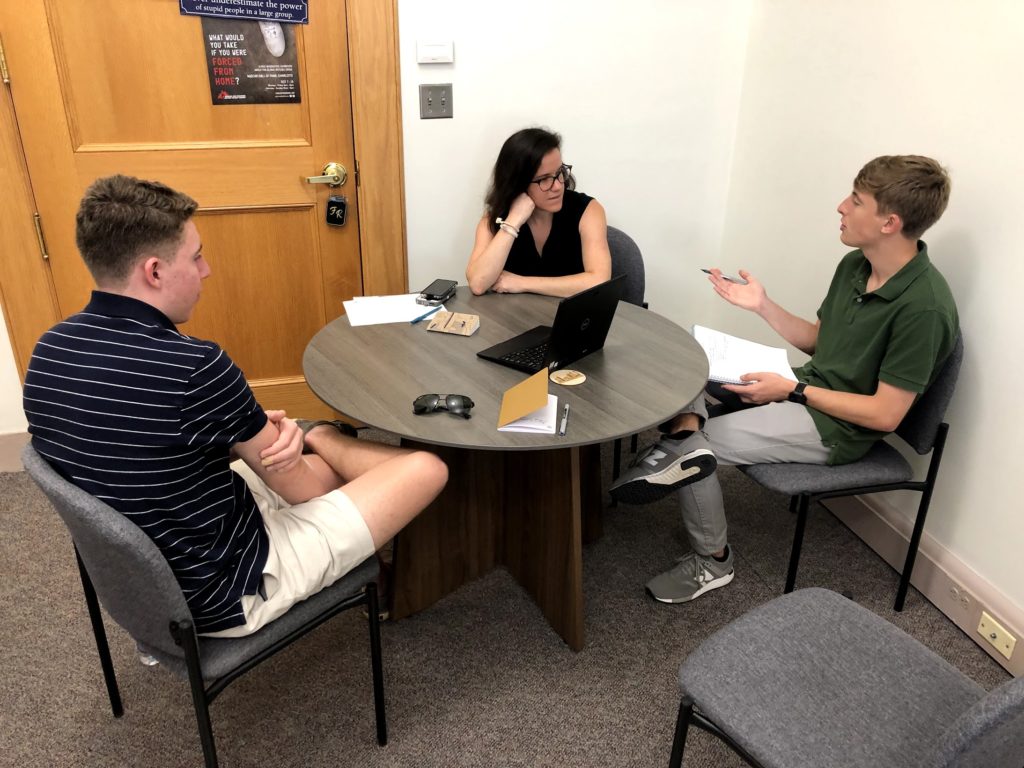
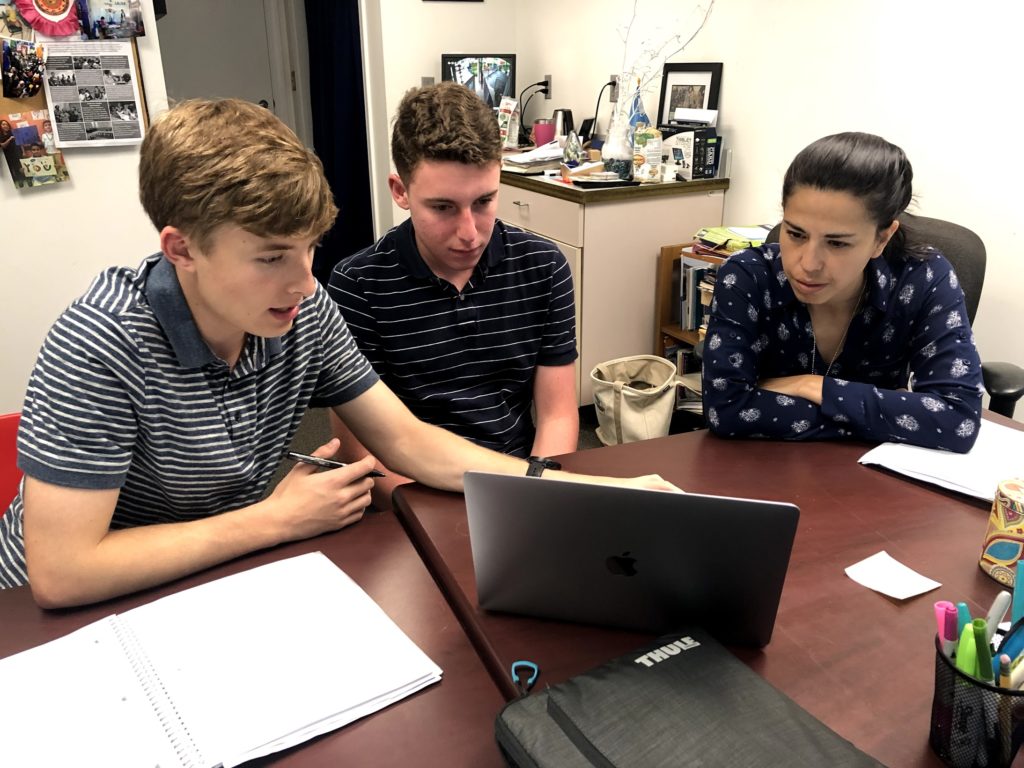
Foster and William Harris meeting with Emily Yaffe at City Hall and Sil Ganzó at ourBRIDGE to gather feedback on the Naturalize Charlotte website.
USSYP: Please tell us about your plans for college this fall if you are going, where you will be going (either virtually or in person) and what ideas you have about what you might like to focus on in college or other future plans. Has the experience of the pandemic changed any of your original thoughts for your future?
I am excited to be attending Haverford College this fall. As of now, I will be attending on-campus. I am interested in pursuing studies in Political Science, Philosophy, and Spanish, among other subjects, and am also interested in Haverford’s Peace, Justice, and Human Rights program.
